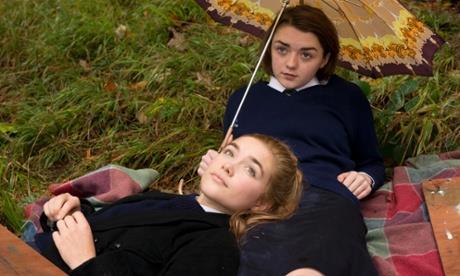Dir/scr: Carol Morley. UK. 2014. 102mins

A dreamy and often delirious dark comedy/psychological drama about a strange outbreak of mass hysterical fainting at a British girls’ school in the late 1960s, Carol Morley’s The Falling confirms her growing reputation (it is the follow-up to her acclaimed documentary Dreams Of A Life), and is also the perfect platform for young British acting talent in the form of Maisie Williams (Arya from television’s Game Of Thrones) and newcomer Florence Pugh.
At the heart of the film is the notion that the split between Abbie and Lydia perhaps unleashes an occult energy, with the schoolgirls coming together to chant underneath an ancient tree and their shared fainting fits fostered by a sense of sexual energy and hysteria.
Its self-conscious left-field oddness helps create a murky atmosphere that relishes the sexual tension, longing and uncomfortable relationships that define the film. But while intriguing and refreshingly strange, it is also a film that fails to gel together at times with the intensity coming across as funny when supposed to be serious, often taking itself a little too seriously when going even more weird and bizarre might have been a good idea. Morley is already being hyped by some of the British press, but there is a sense that she is a work in progress – a talented one to be sure – and this ambitious film (her first pure drama) is a striking calling card.
The casting of Maisie Williams (who is breaking out from television with recent films Heatstroke and Gold) in a lead role will certainly help international marketing, while films such as Heavenly Creature, Innocence and Picnic At Hanging Rock has shown there is mileage in films that mine the turbulent psyche of teenage schoolgirls.
Williams plays Lydia, a feisty and sharp schoolgirl who relishes with friendship with the slightly more rebellious and gently dreamy Abbie (Pugh). Abbie enjoys being the centre of attention, reading outloud in their English class with such gusto the teacher has to reel her in and is founder of the school’s Alternative School Orchestra but most of all is more sexually advanced. While Lydia is still a virgin, Abbie has had sex (as she comments: “He had a car, what can I say?”), and this revelation impacts on their relationship.
Abbie talks of sex to Lydia, is sick in the toilets, reveals her pregnancy but also grows increasingly ill, which takes the film into darker and stranger territory. Lydia soon takes on the mantle and is at the forefront of a virtual contagion of gentle hysteria and fainting amongst many of the schoolgirls (and even the young art teacher), relishing her role as the rebellious one; fighting with her agoraphobic hairdresser mother (Maxine Peake) and also flirting with her older brother.
At the heart of the film is the notion that the split between Abbie and Lydia perhaps unleashes an occult energy (Lydia’s brother also talks about old magick), with the schoolgirls coming together to chant underneath an ancient tree and their shared fainting fits fostered by a sense of sexual energy and hysteria. It is a notion at that works at times – especially in a magnificent scene where girls start to tumble at a school assembly, with even the chain-smoking headmistress, played by Monica Dolan, wobbling slightly as she clutches onto the lectern.
The revelation about Lydia’s past, the relationship with her mother and her fumbling sexual relationship with her brother feel clumsy at times, with the best parts of the film the seductively dreamy atmosphere (fostered by Tracey Thorn’s soundtrack) that beguiles and seduces, and fosters a subtle notion of the occult. It is a film that will resonate with some but leave others exasperated, but The Falling is certainly a bold film, and one to admired and appreciated.
Production companies: Cannon and Morley Productions, BBC Films, BFI, Independent
International sales: Independent Film Co., www.independentfilmcompany.com
Producers: Cairo Cannon, Luc Roeg
Executive producers: Ian Davies, Lizzie Francke, Peter Hampden, Christine Langan, Rebecca Long, Norman Merry, Andrew Orr
Cinematography: Agnes Godard
Editor: Chris Wyatt
Production designer: Jane Levick
Music: Tracey Thorn
Main cast: Maisie Williams, Florence Pugh, Greta Scacchi, Maxine Peake, Monica Dolan, Joe Cole






![The Brightest SunScreen[Courtesy HKIFF]](https://d1nslcd7m2225b.cloudfront.net/Pictures/274x183/3/5/0/1448350_thebrightestsunscreencourtesyhkiff_312678.jpg)














